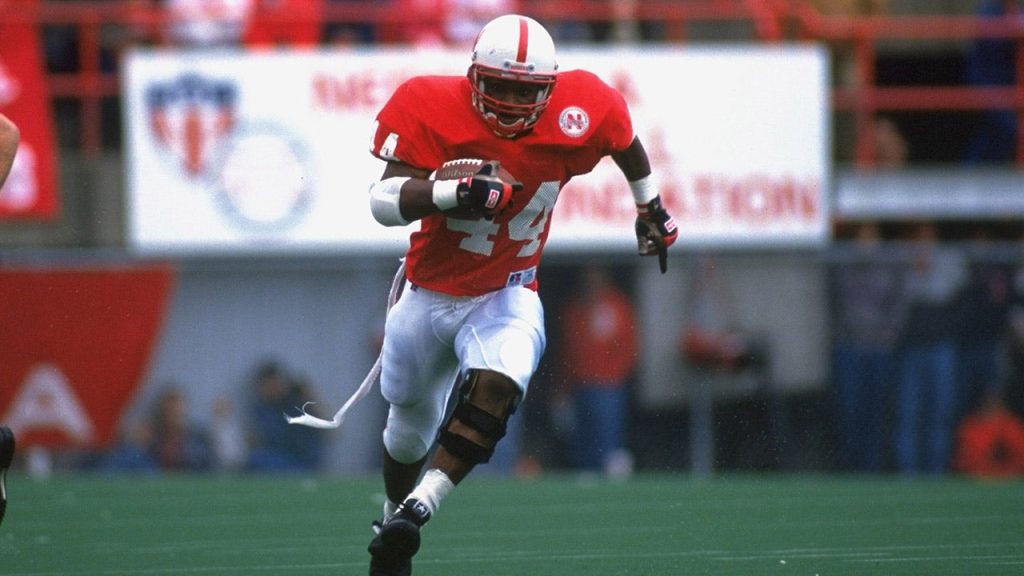Calvin Jones, a name etched in the annals of Nebraska Cornhuskers football and a Super Bowl champion, tragically passed away at the age of 54. His untimely demise, discovered in the basement of his Omaha home, appears to be linked to carbon monoxide poisoning, pending an official autopsy report. Jones’s legacy, however, extends far beyond this tragic incident. He was a standout athlete who captivated fans with his exceptional talent and contributed significantly to the rich history of both college and professional football. His journey, from the gridirons of Nebraska to the Super Bowl stage, is a testament to his dedication, skill, and unwavering pursuit of excellence.
Jones’s collegiate career at the University of Nebraska-Lincoln was nothing short of extraordinary. From 1991 to 1993, he dominated the Big 8 conference, showcasing a remarkable blend of power, speed, and agility. He amassed an impressive 3,183 rushing yards and scored 40 touchdowns during his three-year tenure, leaving an indelible mark on the program. He led the conference in scoring in each of his three seasons, a testament to his consistent dominance and scoring prowess. His sophomore year was particularly noteworthy, as he topped the Big 8 in both rushing yards (1,210) and yards per attempt (7.2), solidifying his place among the elite running backs in college football.
Jones’s partnership with fellow running back Derek Brown revolutionized Nebraska’s offensive strategy. Together, they formed the formidable “we-back” system under head coach Tom Osborne, a tactical innovation that redefined the team’s running game. This dynamic duo terrorized opposing defenses, averaging a staggering 329 yards per game on the ground, a figure unmatched by any other running back duo that season. Their combined efforts propelled Nebraska to the Orange Bowl, showcasing their immense impact on the team’s success. Jones’s ability to complement Brown’s skills created a synergistic force that became a cornerstone of Nebraska’s offensive dominance.
The Los Angeles Raiders recognized Jones’s talent and selected him in the third round of the 1994 NFL Draft. He spent two seasons with the Raiders, gaining valuable experience in the professional ranks and contributing to the team’s offensive efforts. While his NFL career may not have reached the same heights as his collegiate dominance, his dedication and commitment to the sport remained unwavering. He later joined the Green Bay Packers, where he experienced the pinnacle of professional football, contributing to their Super Bowl victory in 1997. This achievement cemented his place in football history, adding a championship title to his already impressive resume.
Jones’s impact transcended statistics and accolades. He was a respected teammate, known for his work ethic, sportsmanship, and infectious enthusiasm. His contributions to the Nebraska Cornhuskers program and his Super Bowl victory with the Green Bay Packers solidified his legacy as a true champion. His untimely passing has left a void in the hearts of those who knew him and admired his remarkable talent. He will be remembered not only for his on-field achievements but also for the impact he had on the lives of those around him.
The circumstances surrounding Jones’s death are a somber reminder of the dangers of carbon monoxide poisoning. While awaiting the official autopsy report, the apparent cause serves as a tragic cautionary tale. Carbon monoxide, an odorless and colorless gas, can be lethal if inhaled in significant quantities. It is crucial to ensure proper ventilation and regular maintenance of fuel-burning appliances to prevent such tragedies. The loss of Calvin Jones is a profound loss for the football community and a stark reminder of the importance of safety precautions in our homes. His memory will live on through his remarkable achievements and the indelible mark he left on the sport he loved.

